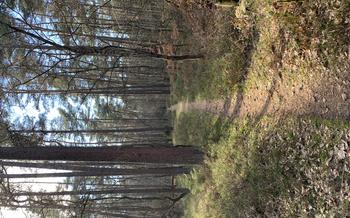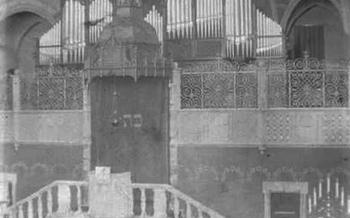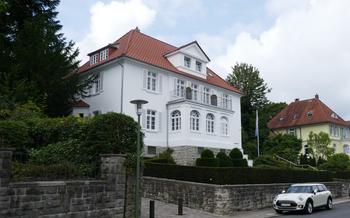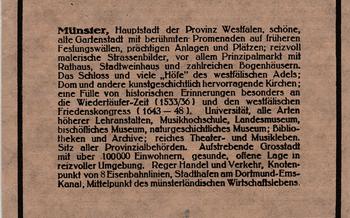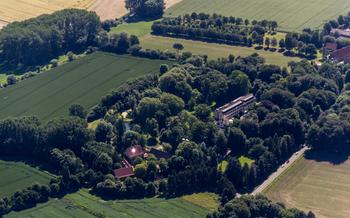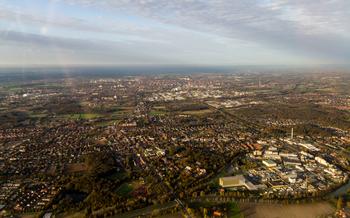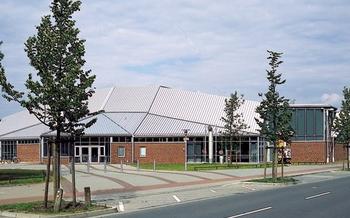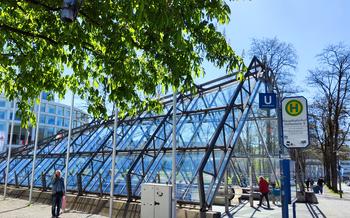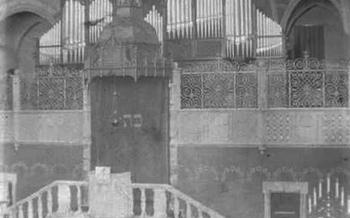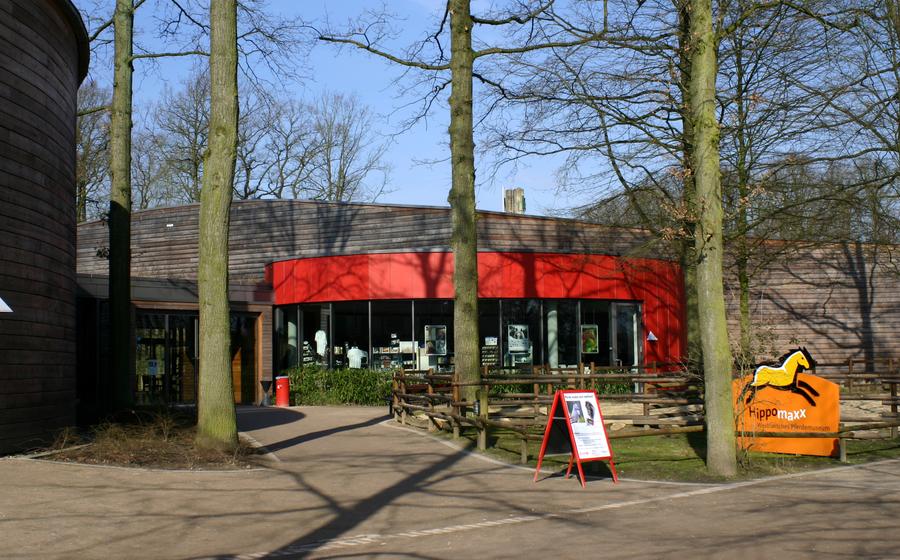
Westphalian Horse Museum
- Historical Background
- Location and Accessibility
- Museum Highlights
- Horse Breeds
- Equestrian Sports
- Horseback Riding Trails
- Equestrian Art and Crafts
- Equestrian Fashion
- Culinary Delights
- Family-Friendly Activities
- Photography Opportunities:
- Accessibility for People with Disabilities:
- Museum Hours and Admission Fees:
- Insider Tip: Discover Hidden Equestrian Gems
Historical Background
In the heart of Westphalia, Germany, steeped in a rich equestrian tradition, lies the Westphalian Horse Museum, a treasure trove dedicated to preserving and celebrating the region's profound connection with horses. Westphalia, renowned for its rolling hills, lush meadows, and deep forests, has long been an ideal breeding ground for horses, fostering a unique bond between humans and these majestic animals. The museum serves as a testament to this enduring legacy, showcasing the pivotal role horses have played in shaping the region's culture, economy, and identity.
The museum's founding in 1972 marked a significant milestone in preserving Westphalia's equestrian heritage. Recognizing the crucial need to document and safeguard this invaluable legacy, a group of passionate enthusiasts came together to establish the museum. Their vision was to create a space where visitors could immerse themselves in the world of horses, gaining insights into their history, significance, and enduring impact on the region.
Location and Accessibility
The Westphalian Horse Museum is conveniently located in the heart of Münster, a picturesque city in North Rhine-Westphalia, Germany. Its exact address is Warendorfer Straße 110, 48151 Münster. Visitors can easily reach the museum by car, using the A1 or A43 motorways, and follow signs for "Westfälisches Pferdemuseum." Ample parking is available on-site for a nominal fee.
For those arriving by public transportation, the museum is well-connected to Münster's efficient bus and train network. The nearest bus stop, "Pferdemuseum," is just a short walk from the museum's entrance, and several bus lines operate from Münster's central train station. The museum is also within walking distance from various hotels, restaurants, and other attractions in Münster's historic city center.
To enhance the visitor experience, the museum's website offers an interactive map and guide that provides detailed directions and information on nearby attractions and transportation options. This user-friendly tool allows visitors to plan their trip efficiently and make the most of their time in Münster.
Museum Highlights
The Westphalian Horse Museum boasts a diverse collection of exhibits that showcase the region's rich equestrian heritage. Visitors can embark on a journey through time as they explore the museum's galleries, which house an array of artifacts, documents, and interactive displays. The museum's prized possession is the "Haflinger Horse," a life-size bronze sculpture by renowned artist August Gaul. This magnificent masterpiece captures the essence and beauty of the Haflinger breed, a small but sturdy horse known for its versatility and endurance.
Beyond the Haflinger Horse, the museum showcases a collection of saddles, bridles, and other equestrian equipment that have been used throughout history. These artifacts provide insights into the evolution of horsemanship and the changing styles of equestrian fashion. The museum also features interactive displays that allow visitors to learn about horse anatomy, training methods, and the role of horses in various disciplines, from dressage to show jumping.
Guided tours of the museum are available for visitors who wish to delve deeper into the exhibits and gain a more comprehensive understanding of the region's equestrian heritage. Knowledgeable guides will lead visitors through the galleries, sharing stories and anecdotes about the horses and people who have shaped Westphalia's equestrian culture. The museum also hosts special events, workshops, and exhibitions throughout the year, offering visitors a chance to engage with experts, participate in hands-on activities, and learn more about the world of horses.
Horse Breeds
The Westphalian Horse Museum is home to a variety of horse breeds native to Westphalia. Among the most notable is the Westphalian Warmblood, a versatile breed renowned for its athleticism, intelligence, and calm temperament. Developed in the 19th century by crossing Thoroughbreds with local mares, the Westphalian Warmblood is a popular choice for dressage, show jumping, and eventing.
Another prominent breed showcased at the museum is the Haflinger. Originating in the Austrian Alps, the Haflinger is a small, sturdy horse with a golden chestnut coat and a distinctive mane and tail. Known for its sure-footedness, endurance, and gentle nature, the Haflinger is well-suited for riding, driving, and pack work.
The museum also features other Westphalian breeds, such as the Münsterländer, a versatile breed used for riding and driving, and the Senner, a rare breed known for its hardiness and strength. Visitors can learn about the history, characteristics, and uses of each breed through interactive displays, informative panels, and guided tours.
Equestrian Sports
Münster and the surrounding region are renowned for their rich equestrian tradition, which has played a pivotal role in the development of modern horse sports. The city is home to numerous equestrian clubs, riding academies, and training facilities, fostering a vibrant community of horse enthusiasts and riders.
Equestrian Events and Competitions Münster and the surrounding area host a wide range of equestrian events and competitions throughout the year, catering to all levels of riders and spectators. From local dressage and show jumping tournaments to international show jumping competitions such as the Münsterland-Trophy, there is always something for horse lovers to enjoy.
Attend an Equestrian Event If you're fortunate enough to visit Münster during one of these events, don't miss the opportunity to immerse yourself in the excitement and energy of the equestrian world. Whether you're a seasoned equestrian or simply an admirer of these majestic animals, attending an equestrian event in Münster is an unforgettable experience. So, be sure to check the event calendar and plan your visit accordingly.
Horseback Riding Trails
Münster and its surroundings offer a network of scenic horseback riding trails that cater to riders of all skill levels. Whether you're a seasoned equestrian or a beginner looking for a leisurely ride, you'll find a trail that suits your needs.
For a relaxing and scenic experience, consider the Aa-See Loop Trail, which takes you around the picturesque Aa-See lake. The trail is relatively flat and easy to navigate, making it ideal for beginners and families with young children.
If you're looking for a more challenging ride, try the Teutoburg Forest Trail. This trail winds through the dense forests and rolling hills of the Teutoburg Forest, offering breathtaking views and plenty of opportunities to gallop.
For a truly unique experience, embark on the Münster Horse Trail. This 100-kilometer trail connects Münster with the neighboring towns of Warendorf and Telgte, taking you through charming villages, lush meadows, and historic landmarks.
Guided horseback riding tours are also available for those who prefer a more structured experience. These tours typically include a knowledgeable guide who will lead you on a scenic trail, sharing stories and insights about the region's equestrian heritage.
No matter your skill level or experience, horseback riding in Münster and the surrounding area is a fantastic way to explore the region's natural beauty and equestrian culture. So saddle up and embark on an unforgettable adventure!
Equestrian Art and Crafts
Münster is home to a thriving community of artisans and craftsmen who specialize in equestrian art and crafts. From intricate sculptures and paintings to handcrafted saddles and bridles, there is something for every equestrian enthusiast. Visitors can find unique souvenirs and memorabilia to commemorate their visit to the museum or the region.
The Westphalian Horse Museum Shop offers a wide selection of equestrian-themed gifts and souvenirs, including books, postcards, and plush toys. For those looking for something truly special, the Equestrian Art Gallery showcases the work of local artists who specialize in equine-inspired paintings, sculptures, and mixed media pieces.
Visitors can also find a variety of equestrian-themed crafts and accessories at the Münster Christmas Market, which takes place annually in the city's historic center. From hand-painted horse ornaments to custom-made leather goods, there is something for everyone at this festive market.
Whether you're looking for a unique gift for a fellow equestrian enthusiast or simply want to add a touch of equestrian flair to your home décor, Münster is the perfect place to find it.
Equestrian Fashion
Equestrian fashion is a unique blend of style and functionality, reflecting the deep connection between horses and their riders. In Münster, visitors can find a range of boutiques and stores specializing in equestrian clothing and accessories. These shops offer a curated selection of high-quality riding apparel, footwear, and accessories, catering to both professional riders and enthusiasts alike. From classic riding boots and breeches to elegant show jackets and helmets, visitors can find everything they need to dress appropriately for a visit to the museum or equestrian events.
Local artisans and craftsmen also showcase their skills in creating unique equestrian-inspired fashion items. Visitors can find handmade leather goods, such as belts, bags, and saddles, adorned with intricate equestrian motifs. Jewelry pieces featuring horse-related designs, such as necklaces, bracelets, and earrings, are also popular souvenirs. For those who want to make a statement, custom-made riding attire and accessories can be commissioned from local designers, ensuring a truly personalized equestrian wardrobe.
Culinary Delights
Münster offers a culinary journey that celebrates its equestrian heritage. Visitors can indulge in traditional Westphalian dishes that incorporate horse meat or other equestrian-related ingredients. One must-try dish is the "Pferdewurst," a flavorful horse sausage often served with sauerkraut and mashed potatoes. For a unique culinary experience, try the "Rossbraten," a tender horse steak cooked to perfection and accompanied by a rich sauce.
For those who prefer a modern twist, several restaurants in Münster offer innovative dishes inspired by the region's equestrian culture. Visitors can savor gourmet burgers made with horse meat, artisanal pizzas topped with horse salami, or elegant horse carpaccio served with a drizzle of olive oil and balsamic vinegar. Local cafes also offer horse-themed pastries and desserts, such as "Pferdeleckereien" (horse treats), which are delicious cookies shaped like horseshoes.
My personal recommendation is the "Westfälisches Pferdefilet," a succulent horse tenderloin grilled to perfection and served with a creamy mushroom sauce. This dish perfectly embodies the culinary traditions of Münster and Westphalia, offering a taste of the region's equestrian heritage.
Family-Friendly Activities
The Westphalian Horse Museum is a great place for families with children of all ages. The museum offers a variety of interactive exhibits and educational programs that are designed to engage and entertain young minds. Children can learn about the history of horses in Westphalia, the different breeds of horses that originated in the region, and the role that horses have played in human culture throughout history. The museum also offers guided tours that are tailored specifically for children, which can be a great way for them to learn more about horses and the museum's collection.
In addition to the museum's exhibits and programs, there are also a number of family-friendly equestrian events and activities that take place in Münster and the surrounding area. These events include horse shows, riding competitions, and pony rides. There are also a number of riding stables in the area that offer lessons and trail rides for all ages.
To make the museum visit more enjoyable for children, it is a good idea to plan ahead. Be sure to check the museum's website for information on upcoming events and programs. You may also want to bring snacks and drinks for your children, as there is no food available for purchase at the museum.
Photography Opportunities:
The Westphalian Horse Museum and its surroundings offer ample opportunities for capturing stunning photographs. The museum's beautifully designed exhibits, with their elegant horses and intricate displays, provide a perfect backdrop for photography enthusiasts. Step outside the museum, and you'll find yourself surrounded by charming streets, picturesque canals, and historic buildings, all begging to be captured through the lens.
Whether you're a professional photographer or simply enjoy taking snapshots, there's no shortage of photo-worthy moments at the Westphalian Horse Museum. Capture the grace and power of horses in motion during a riding demonstration or equestrian event. Zoom in on the intricate details of a horse's tack or the delicate craftsmanship of a horse-drawn carriage. Don't forget to look up and capture the museum's striking architecture against the backdrop of Münster's vibrant cityscape.
Share your equestrian photography adventures on social media using the hashtag #WestphalianHorseMuseum. Connect with fellow photography enthusiasts, showcase your skills, and inspire others to explore the beauty of horses and equestrian culture through the art of photography.
Accessibility for People with Disabilities:
The Westphalian Horse Museum is committed to providing an inclusive and accessible experience for all visitors, regardless of their abilities. The museum features a range of accessibility features to ensure that everyone can enjoy and learn from its exhibits.
Wheelchair users and visitors with limited mobility can easily navigate the museum's spacious galleries and exhibits. Ramps and elevators are available to access all levels of the museum, ensuring a seamless and barrier-free experience. Designated seating areas are provided within the museum's theater and educational spaces, allowing visitors with disabilities to comfortably participate in presentations and programs.
The museum also offers assistive listening devices and closed captioning for its audiovisual presentations, catering to visitors with hearing impairments. Braille signage and tactile exhibits are available throughout the museum, enabling visually impaired visitors to explore the exhibits and learn about the history of horses in Westphalia.
In addition, the museum provides accessible parking spaces close to the entrance, ensuring convenient access for visitors with disabilities. Trained staff members are always on hand to assist visitors with any accessibility needs, providing guidance and support throughout their visit.
Museum Hours and Admission Fees:
The Westphalian Horse Museum is open to the public from Tuesday to Sunday, from 10 am to 5 pm. It remains closed on Mondays and major holidays. Admission fees are quite reasonable, with adults paying a modest fee, while children, students, and seniors receive discounted rates. The museum also offers free admission on the first Sunday of every month, making it an excellent opportunity for budget-conscious travelers or families to visit. It's worth noting that guided tours are available for groups of 10 or more visitors, but advance booking is recommended to secure a spot.
Insider Tip: Discover Hidden Equestrian Gems
Beyond the museum's walls, Münster and Westphalia offer a treasure trove of equestrian experiences waiting to be discovered. For a truly immersive journey, venture into the countryside and visit one of the many stud farms or riding stables. Here, you can witness the grace and power of these magnificent animals up close and even take a horseback riding lesson or embark on a guided trail ride through the picturesque landscapes. Don't miss the chance to connect with the region's equestrian heritage and create lasting memories in the heart of horse country.
